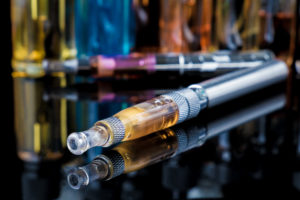
The Supreme Court strikes down restrictions on concealed carry laws, FDA announces new limits on nicotine levels in tobacco products, and more…
IN THE NEWS
- The U.S. Supreme Court, in a 6-3 decision, struck down a New York law that required individuals to provide a reason to qualify for a license to carry a concealed handgun outside the home. The Court held that the Second and Fourteenth Amendments protect the right of an individual to carry a handgun for self-defense both at home and in public. The Court reasoned that New York’s special need requirement infringed upon individuals’ Second Amendment right. Justice Breyer pointed to recent mass shootings as part of the U.S.’s “disproportionately high rate of firearm-related deaths and injuries” that motivated his dissent in part, while Justice Alito criticized Breyer’s reference in his concurrence as serving “no legitimate purpose.”
- The U.S. Food and Drug Administration (FDA) announced its intention to develop a proposed rule that would set a maximum nicotine level for cigarettes and other tobacco products. The plan is part of the Biden Administration’s efforts to reduce smoking-related deaths. The FDA projected in 2018 that a nicotine standard could result in 8 million fewer people dying from tobacco-related illnesses by 2100. Robert M. Califf, the FDA Commissioner, said that lowering nicotine levels “would decrease the likelihood that future generations of young people become addicted to cigarettes and help more currently addicted smokers to quit.”
- The U.S. Department of Education announced proposed changes to Title IX regulations. The proposed changes would prohibit discrimination against transgender students in schools receiving public funds, which would reverse Trump Administration regulations. The proposed changes would also amend rules governing how schools investigate and resolve claims of sexual assault and harassment. The Education Department, however, noted that the proposed changes do not address transgender students’ participation in athletics, but stated that it would do so in a separate rulemaking. Education Secretary Miguel Cardona said the proposed changes will further the “mission of creating educational environments free from sex discrimination and sexual violence.”
- FDA ordered e-cigarette manufacturer Juul to cease selling its e-cigarettes in the United States. Juul previously discontinued several fruit-flavored vaping pods in 2019 amid concerns that the flavored pods were attracting teenage users. FDA’s action is in response to an application that Juul filed two years ago to continue selling its e-cigarettes in the United States. FDA’s review involved analyzing the effectiveness of e-cigarettes in getting smokers to quit and determining whether these benefits outweigh the potential health consequences to new users, such as teenagers, who may be drawn to e-cigarettes.
- The Centers for Disease Control and Prevention (CDC) recommended that eligibility for COVID-19 vaccination be extended to children between six months old and five years old. This expansion allows young children to receive either the Pfizer-BioNTech or Moderna vaccines. CDC Director Rochelle P. Walensky stated that expanding eligibility is “another important step forward in our nation’s fight against COVID-19.”
- The U.S. Senate passed a gun safety bill that will strengthen background checks for young gun buyers by expanding access to juvenile criminal records, investing $7 billion in mental health services, and prohibiting any individual in a dating relationship who has committed domestic violence from owning a gun. Senator Chris Murphy (D-CT), a lead negotiator behind the bill, stated that the bill “will be too little for many” and “too much for others” but he nevertheless celebrated that it “is going to save lives.”
- The U.S. Department of Justice issued a request for comments on a proposed rule that aims to confirm the CARES Act—legislation providing emergency aid during the pandemic—authorization of home confinement for inmates beyond the pandemic period. CARES Act authorization currently covers the emergency pandemic period and allows for inmates to be transferred out of prison and into their homes to serve the remainder of their sentences. The Justice Department is seeking to extend this authorization beyond an emergency pandemic period. The Justice Department stated that home confinement reduced crowding in prisons, removed immunocompromised inmates from the prison environment, and allowed for ongoing monitoring of inmates.
- The U.S. Department of Health and Human Services (HHS) released a schedule of thirteen international flights that will transport infant formula to the United States to address the current shortage—all part of “Operation Fly Formula.” In total, Operation Fly Formula is expected to import 17 million 8-ounce bottles of formula by June 26. Many U.S. agencies, such as the U.S. Department of Agriculture and the U.S. Department of Defense, are partnering with other nations to increase the supply of infant formula in American stores.
WHAT WE’RE READING THIS WEEK
- In a Brookings Institution report, Rachel Sachs, a law professor at Washington University in St. Louis, Marta Wosińska, deputy director of policy at the Duke-Margolis Center for Health Policy, Richard G. Frank, a professor of health economics at Harvard Medical School, and Loren Adler, associate director at the USC-Brookings Schaeffer Initiative for Health Policy, discussed methods to increase generic pharmaceutical market entry and price competition through FDA authority. Sachs and her coauthors proposed that FDA penalize pharmaceutical companies that submit needless citizen petitions, which can delay a generic drug’s approval and release onto the market until further investigation is conducted. Sachs and her coauthors noted that this stalling tactic can reduce market competition for a drug while its pending generic version is not yet on the market. Sachs and her coauthors discussed means of promoting competition, including lowering the current standards for creating generic versions of drug-devices and encouraging manufacturers of generic products to market their drugs within six months of challenging an original drug’s patent.
- In an International Monetary Fund (IMF) working paper, Dimitri G. Demekas, visiting senior fellow at the London School of Economics, and senior IMF economist Pierpaolo Grippa, discussed the increased public support for a transition to a low-carbon economy. Demekas and Grippa argued that public support has fueled demand for central banks and financial regulators to take on a larger role in advancing the transition, but they warned that financial regulators’ ability to do so should not be overestimated. Demekas and Grippa argued that regulators have an important role in facilitating the market’s transition, but regulators and banks must be careful to avoid “unilaterally expanding their mandate” to achieve climate goals. Demakas and Grippa warned, however, that unilateral action may lead to regulators and banks “inadvertently fueling market volatility” rather than advancing “market integrity and stability.”
- In a Center for American Progress (CAP) report, Kevin DeGood, director of infrastructure policy at CAP, argued that the U.S. Congress should reform existing legislation to allow airports to use federal funding and other revenue programs to improve energy efficiency. DeGood explained that under current regulations, airports may only use these funds to improve energy efficiency if they are also enhancing the airport’s capacity. DeGood advocated reforming these rules to allow airports to pursue energy efficiency as a standalone goal. DeGood also asserted that the U.S. Federal Aviation Administration should prioritize grants for airports that demonstrate progress in improving their energy efficiency.
EDITOR’S CHOICE
- In an essay in The Regulatory Review, Matthew Shudtz, formerly the executive director of the Center for Progressive Reform, and Jeff Hauser, executive director of the Revolving Door Project, described the story of an Office of Management and Budget (OMB) employee who often attended meetings with tobacco and e-cigarette executives but subsequently founded a consulting company that lobbied on behalf of the tobacco industry. Shudtz and Hauser explained that this lobbying helped curtail early FDA efforts to ban flavored vaping pods. Shudtz and Hauser argued that a loophole in federal ethics law, which allowed the former OMB employee to lobby for the tobacco industry, may be responsible for the sharp increases in vaping seen among teenagers.



